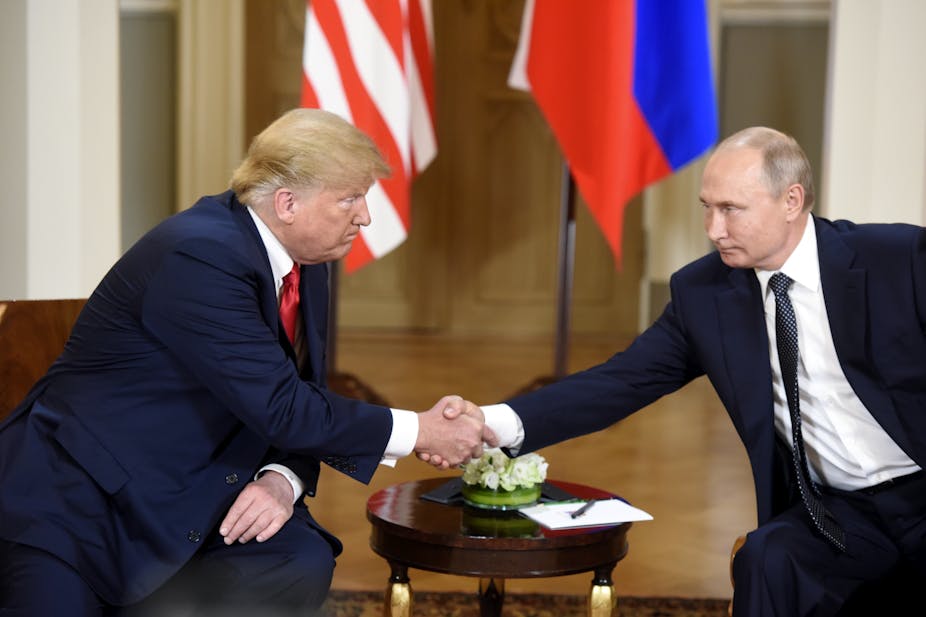Russian president Vladimir Putin’s summit with US counterpart Donald Trump was never going to be a balanced negotiation.
Putin had everything to gain, and Trump everything to lose. The Russian president controlled the agenda from the start, and Trump apparently didn’t even realise he needed to prepare. Putin came to the negotiations fresh from the diplomatic triumph of the World Cup (which even overshadowed the latest Novichok poisonings in the UK); Trump came fresh from a disastrous NATO summit and a terrible visit to the UK, where he was met by throngs of balloon-wielding protesters. It isn’t hard to see who’s running this show.
The week before the meeting, aboard Air Force One, Trump announced the issues he was prepared to negotiate on, including Crimea and Syria. He couldn’t have picked a better agenda for Putin, who wants concessions on all these matters and now has the opportunity to get them.
While this could have been a chance for Trump to reign in Russian power, no one ever seriously expected him to do so. Despite the president’s claim that he’s a great deal maker, he has been widely criticised as a useless diplomat who gives away US interests without a fight. Against the canny and experienced Putin, he’s political fresh meat.
Donald the unready
Trump also arrived in Helsinki direly unprepared. Whereas Russia has been strategising about this meeting since it was announced, Trump has not put together a concrete plan of action. Past diplomatic progress between the US and Russia has depended on preparation, such as Barack Obama’s 2009 summit with Russia’s then president, Dmitry Medvedev. Calling that summit a success might be pushing it, but Obama did still walk away with the beginnings of a new nuclear agreement, undeniably a major diplomatic win. Yet this achievement was only possible because of the incredible amount of planning that happened before the summit. Trump did not do this work, and so he came into the summit at a significant disadvantage.

Hardly surprising then that key experts on US foreign policy such as Jon Wolfsthal are concerned that Trump is about to sell the proverbial farm. Specifically, they are worried that Trump could recognise Russia’s claims in Crimea and undermine US assurances to Ukraine.
Trump might also destabilise the fragile US-Russian relationship on nuclear weapons or allow Putin to interfere even further in Syria. He could even threaten his own recent denuclearisation agreement with North Korea if he doesn’t come down hard on Putin’s violation of sanctions against Kim Jong-un. None of these outcomes are good.
The agenda, however, is only a part of the problem. Just holding the summit is a major setback for international politics. Putin wants to disrupt the Western alliance, and he has advanced that cause simply by getting Trump to show up.
Looking good
Having got a PR boost from his nuclear summit with Kim, where he got to swagger around looking like the impressive statesperson he is not, Trump wants another. And he may get one. Taken at face value, opening up a political dialogue with Putin does look good. Putin, meanwhile, has been handed a PR gift at a crucial moment. He’s keen to shake off his image as something of an international pariah; by agreeing to meet with Putin, Trump has lent him an air of legitimacy and suggested that Russia is on an equal footing with the US, rather than a deviant outlier state that can’t be counted on.
This situation not only unnecessarily bolsters Putin’s power, but also makes Trump look weak in comparison. Back home, Trump has already been accused of being Russia’s puppet and the summit will not improve his reputation. The meeting is also far from a politically savvy move given the ongoing investigation by US Special Counsel Robert Mueller into allegations that Trump aides and associates colluded with Russia during the 2016 presidential campaign. By apparently ignoring these allegations, Trump’s engagement with Putin makes him look shady.
Trump’s desire to boost his reputation will also be his downfall. Putin is a shrewd politician; he knows that the way to Trump’s heart is through Trump’s ego, and that flattery will get him the concessions he wants. Trump’s overinflated sense of self could lead to some dangerous and questionable political agreements being made.
That Trump is engaging with otherwise difficult politicians should be a major plus. But scratch the surface, and Trump simply does not have the political prowess, knowledge, and experience to handle it. Putin, by contrast, has all those qualities in spades.

